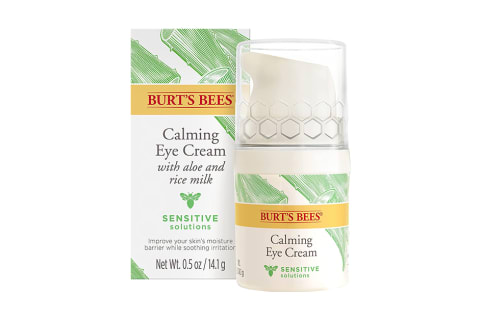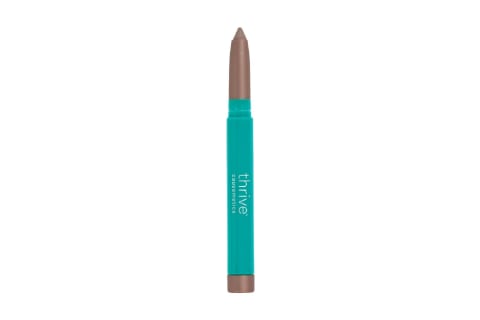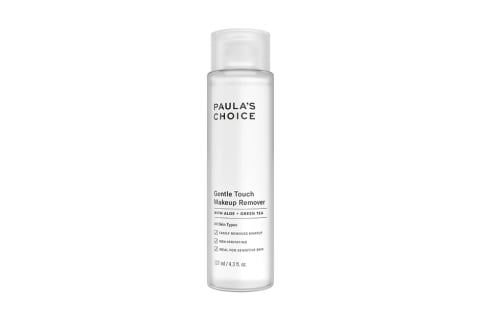Everything You Need To Know About Dry Eyelids — From Causes To Remedies + FAQ

If your eye makeup is flaking off, if your lids tingle when you get them wet, or your eyelids are just plain dry—you've come to the right place. Even if you have oily skin overall, you might still struggle with a dry lid or two every once in a while—and given how sensitive the area is, this can even become painful.
If you don't know why your lids are drying out, we've got you covered. Plus, what to do next, when to see a doctor, and some of the best products for dry, sensitive lids.
Why is the skin around the eyes so sensitive?
As you can feel, the skin around the eyes is much different from the rest of the face. "Eyelid skin is amongst the thinnest skin of anywhere on the body, and therefore it should come as no surprise that it's extra-sensitive and delicate," board-certified dermatologist Rebecca Marcus, M.D., tells mbg.
This is one reason why the under-eyes and eyelids tend to age quickly, showing fine lines and wrinkles before other, thicker parts of the face like the cheeks.
The eye itself is also prone to irritation—just think about how easy it is to get eye shadow, eyeliner, eyelashes, or even dust and smaller particles stuck in there. Plus, there are hair follicles where your lashes and brows grow, which is another spot that's prone to infection and irritation.
Not to mention, plenty of people wear eye makeup every single day. Whether it be shadow, liner, or mascara, prioritizing clean ingredients is a must given that the product is so close to your eye.
With all of these factors combined, it's no wonder the eyes are more prone to dryness and irritation. If you've had dry, flaky, or rashy eyes before, you're certainly not alone. The causes of dry eyelids vary greatly—the most common below.
What are the causes of dry eyelids.
There are so many reasons that your eyelids could be dry—some may be in your control, while others aren't so much. Here, an overview of the most common causes of dry eyelids.
Rubbing.
PSA—while rubbing your eyes may feel great in the moment, you'll want to hold off if your eyelids start to get dry, itchy, or red. "Rubbing the eyes may cause micro-tears in the skin and subsequent disruption of the skin barrier, leading to transepidermal water loss," Marcus says.
"Chronic rubbing can cause lichenification of the skin—darkening and thickening," board-certified dermatologist Hadley King, M.D., tells mbg. "Also, rubbing the eyes increases risk of exposing this delicate skin to something on the fingers that could trigger contact dermatitis," she continues. More on dermatitis in a bit.
Dry skin naturally.
If you naturally have dry skin, you should know that having extra-dry eyelids is not out of the ordinary. Because the skin is thinner and more susceptible to damage, it may be the first spot to dry out on your face.
What's more, plenty of people often forget about the eyelids when layering hydrating serums and moisturizers on. While you should be more careful about which products you select, the eye skin does need some TLC too. We'll go over how to find the best products below.
Age.
Environmental factors.
Some dry skin on the eyelids may be seasonal—as fall and winter tend to lack humidity. Plus, a chilly breeze can give the delicate eye skin a wind rash, resulting in irritation and dryness.
Especially for those living in cities or other high-pollution areas, your skin is more subject to oxidative stress—which, in essence, is when molecules called free radicals cause damage to skin cell structure and DNA4.
Sun damage.
If you're not going to put sunscreen on the eyelids, then you should be wearing sunglasses. Beyond the risk of accelerated skin aging, "Excess sun can also cause actinic keratosis, or precancerous lesions that can occur around the eyelid and brow region appearing as dry, scaly, sharp red bumps," board-certified dermatologist Jason Miller, M.D., FAAD, tells mbg.
Contact dermatitis.
"Eyelids are a common location for contact dermatitis because the skin in this area is delicate, and we often touch our eye area—which means we are exposing this skin to potential irritants and allergens on our fingers," King says.
In fact one of the most common eye irritants comes from a surprising place: "Interestingly, eyelids are a common location for allergies to nail products to show up because the skin on our fingers is thick and robust, while the skin on our eyelids is thin and delicate," she continues.
Of course, keeping your eye products clean is a must—but you may want to consider opting for clean, nontoxic nail polish as well—here are a few of our favorite brands to get you started.
Atopic dermatitis.
"Eczema (atopic dermatitis) can sometimes affect the eyelids," King says. Even if you don't have eczema on your entire face, you can still have eczema patches on the eyelids. It will be extra important to use eczema-safe products in this area—more on that to come.
Dry eyes.
If your eyes themselves are dry, your lids may be next in line. If you want to learn more about causes and treatments for dry eyes—read this.
Rosacea.
Like eczema, rosacea can affect one part of the face such as the lids or the face as a whole. Rosacea can show up as redness and sensitivity but also small pimplelike bumps. Be sure to see a dermatologist to determine whether or not you have rosacea before trying to clear it up on your own.
Blepharitis.
"Blepharitis is inflammation of the Meibomian glands in the eyelids that causes dry, itching, and inflamed eyelid skin," Marcus explains. There are plenty of prescription-grade products that can help with this, from special eyedrops to antibiotics, but you should get a diagnosis from a medical professional to treat this kind of inflammation.
Dehydration.
As Marcus mentioned earlier, the eyelids may be particularly sensitive to drying out. If you're lacking water—whether it be internal or external—that may be contributing to dry eyelids (and dry eyes, as well).
Smoking.
Smoking can have many effects on the body, eyes included. "Smoking causes vasoconstriction or decreased blood flow to the skin, which in turn inhibits optimal delivery of nutrients and oxygen to the skin," Marcus says. "This can lead to dry, dull skin," she continues.
Eye strain and stress.
If your eyes are strained (aka, you're not wearing glasses or contact lenses when you need to be or you're on the screen all day long), your eyes may suffer and, in turn, dry out your eyelids.
"When we're on screens, we only blink half as often as we do normally," optometrist Mary Ann Ellement, O.D., once told mbg.
Lack of sleep.
Gentle reminder: How much and how well you sleep does impact your skin, and maybe more than you think. Lack of high-quality sleep contributes to higher TWEL, or transepidermal water loss5, research shows.
Makeup use & sleeping in makeup.
What kind of mascara, eyeliner, and eye shadow you wear all impacts your eye health and the health of your eyelid skin. Especially if you sleep in your makeup (it happens to all of us on occasion, but still try to avoid it when you can), your risk is even higher.
See, sleeping in your makeup may increase the chance that the products drip into the eye itself or sit on the lid for too long and cause irritation. More on spotting clean products below.
Harsh face washes.
If you use a face wash with any exfoliants (whether it be a gentle physical exfoliant or chemical exfoliants like AHAs and BHAs), do not put it on your eyelids. These cleansers can irritate the delicate skin and lead to dryness.
Use a gentle makeup remover, such as an oil cleanser or micellar water to remove your eye makeup (on the lid, lashes, and under the eyes) before cleansing and keep the cleanser away from these delicate areas.
Getting potent products on your eyelids.
If you use retinol or chemical exfoliant serums of any kind, avoid the eyelid and under the eyes to prevent dryness and irritation.
Even if you don't think you're spreading the product where it shouldn't go, you might not be washing your hands after applying the serum and before applying your moisturizer or eye cream.
A caveat: Some retinols or serums are formulated for the eye area specifically—those are usually fine, although you will likely want to proceed with caution if you have sensitive lids.
Solutions for dry eyelids.
Now that you have an idea of what could be causing your dry eyelids, let's walk through how to fix it:
Identify your triggers.
The first step is trying to identify what is causing your dry lids in the first place. Use the list above as a guide and walk through each step, using the process of elimination to figure out which one (or two, or three) might apply to you. This will guide the next few steps.
Stop using potent products.
As previously mentioned, spreading potent products to delicate areas like the eyes is a big no-no. Wash your hands after applying retinol or exfoliants to the skin, and then follow up with moisturizer on your whole face, including the eyes.
If you want even more protection, apply your eye cream or an occlusive oil to the eyelids and under eyes before using your potent serums. This will help protect the skin going forward in your routine.
Use simple, calming eye creams.
Retinol eye creams can work wonders for fine lines and wrinkles, but they're not for everyone. If you have dry, sensitive eyelids (or under-eyes), then a gentle, calming eye cream will be a better fit. Scan this list for some A+ products to consider.
Practice diligent and gentle makeup removal.
Set an alarm to get up and remove your makeup and cleanse your skin when you begin to feel sleepy. Better yet, if you tend to sleep in your makeup often, keep a daily reminder on your phone to take it off. (Eventually, it will become habit and you won't have to set reminders.) This will help prevent eye irritation and dry eyelids, as well as encourage healthy skin overall.
Switch makeup products.
Avoiding eye makeup while your eyelids are peeling, flaking, or burning is the best way to speed up the healing process. However if you do choose to wear makeup, be sure it's safe. Look for fragrance-free formulas or brands.
Switching to clean and natural eye products is a must. This will help minimize irritation to the dry area and prevent future dryness. Look for cream eye shadows and eyeliners rather than drying powder shadows.
Be sure to keep your mascara as natural as possible as well—here are our top picks if you're ready to shop.
Keep your fingers away.
As King has mentioned throughout, your hands pick up a ton of dirt and irritants throughout the day. Try to wash your hands often and never touch your face before cleansing them.
Address lifestyle considerations.
It's certainly easier said than done, but prioritizing sleep and stress management can have a significant impact on your skin. In addition, phasing out harmful practices like smoking cigarettes and not consuming enough water will make drastic differences as well.
Get an eye health supplement.
If your eyelids are second to your eye pain, redness, itchiness, or general discomfort, then you may want to consider adding an eye health supplement to your routine—here's a quick list of the best ones we've found to save you some time.
Know when to visit a derm or M.D.
If your dry eyelids are leading to pain and discomfort, or they persist for more than a few weeks of at-home treatment, then you should consult a dermatologist. Seeing a derm will open the doors for prescription-grade remedies as well as help you get to the bottom of the initial cause.
Topical ingredient do's.
If you're choosing a serum, moisturizer, or eye cream for dry or sensitive lids, look for these ingredients:
- Oat extracts
- Squalane
- Ceramides
- Aloe vera
- Hyaluronic acid
- Panthenol (aka provitamin B5)
- Calendula
Topical ingredient don'ts.
Now, a few ingredients to avoid getting on this sensitive area:
- Prescription-grade retinoids and potent retinols not formulated for the eye area
- AHAs/BHAs
- Essential oils
- Benzoyl peroxide
- Metals
- Propylene glycol
FAQ
What is milia?
Milia is very different from dry eyelids. Milia consists of small white bumps around the eyes. Inside the bumps is a buildup of keratin. The bumps generally do not get inflamed or swollen; however, they can persist for months. Want to learn more? Read this.
Can stress cause dermatitis?
If you frequently get dermatitis, whether it be on the eyes or elsewhere, it may be due to increased stress. When cortisol is released in large amounts (i.e., during extended periods of high stress), it can suppress the immune system and increase inflammation throughout the body. This, in turn, can make you more susceptible to infections including dermatitis. So while stress won't directly cause dermatitis, it may make you more susceptible.
Are dry eyelids a sign of thyroid disorders?
Research studies have shown a correlation between increased eye dryness and the presence of thyroid disorders. If your dry eyes won't go away, it may be a sign of a larger full-body condition that your doctor may look into.
Products to try:
The takeaway.
Dry eyelids can be pesky, painful, and hard to manage. The best way to go about treating them is to identify your triggers, use clean and gentle eye products, and see a doctor if the dryness persists or gets worse. Easing dry eyes is a whole different story—if that's what you're looking for, check out this breakdown, too.

Hannah Frye is the Assistant Beauty & Health Editor at mindbodygreen. She has a B.S. in journalism and a minor in women’s, gender, and queer studies from California Polytechnic State University, San Luis Obispo. Hannah has written across lifestyle sections including skin care, women’s health, mental health, sustainability, social media trends, and more. She previously interned for Almost 30, a top-rated health and wellness podcast. In her current role, Hannah reports on the latest beauty trends and innovations, women’s health research, brain health news, and plenty more.


